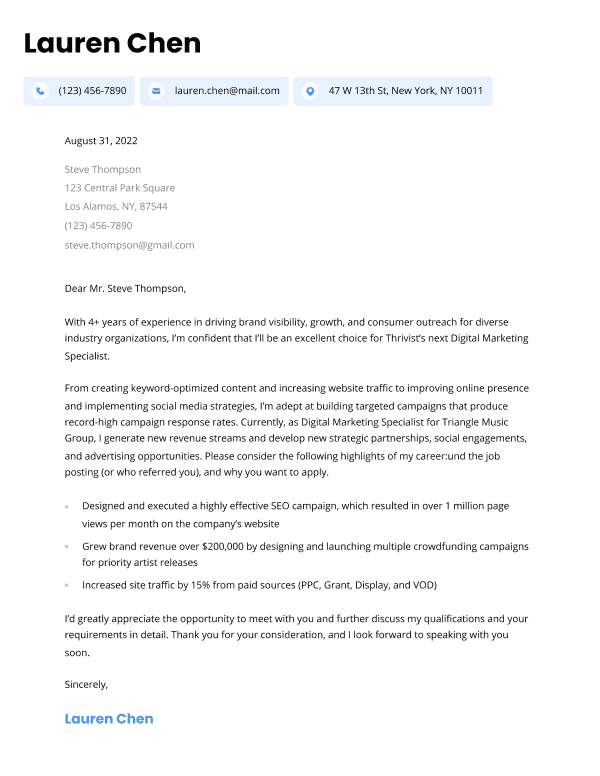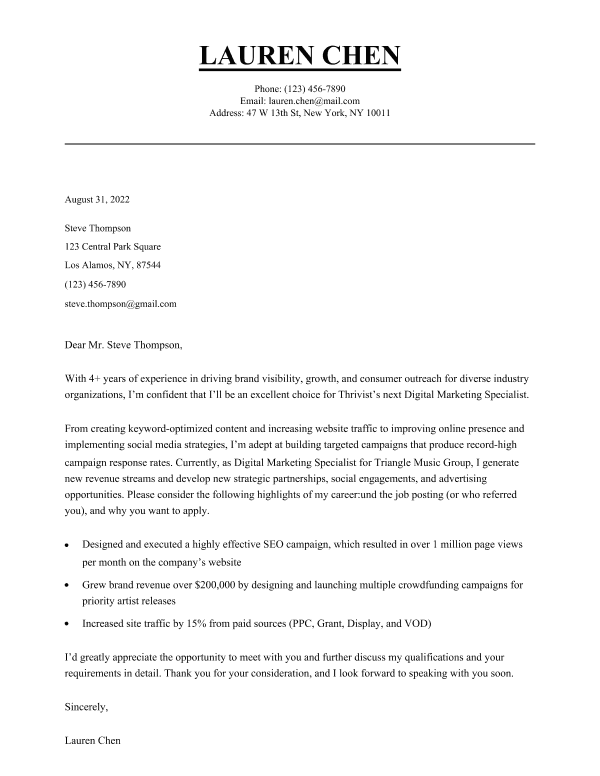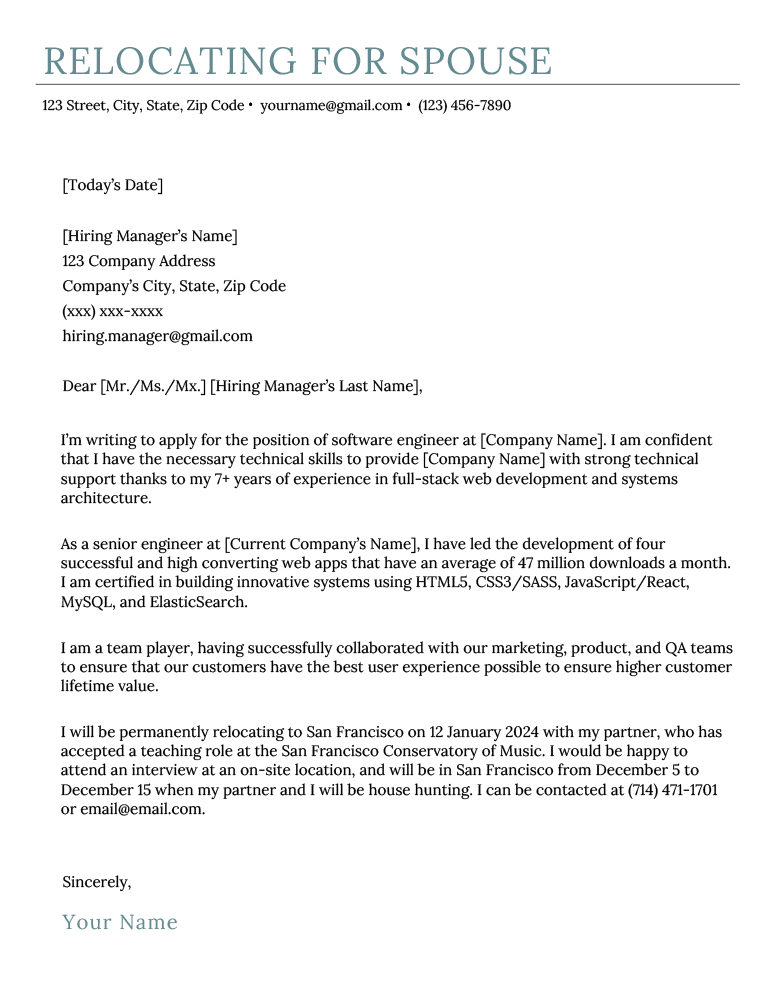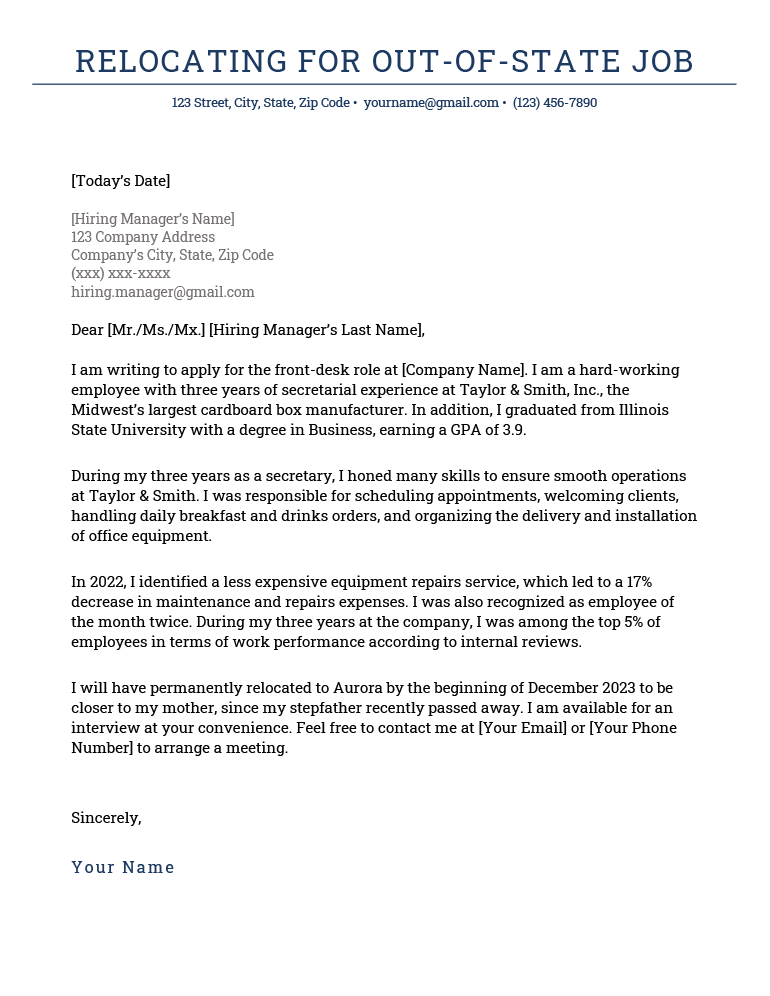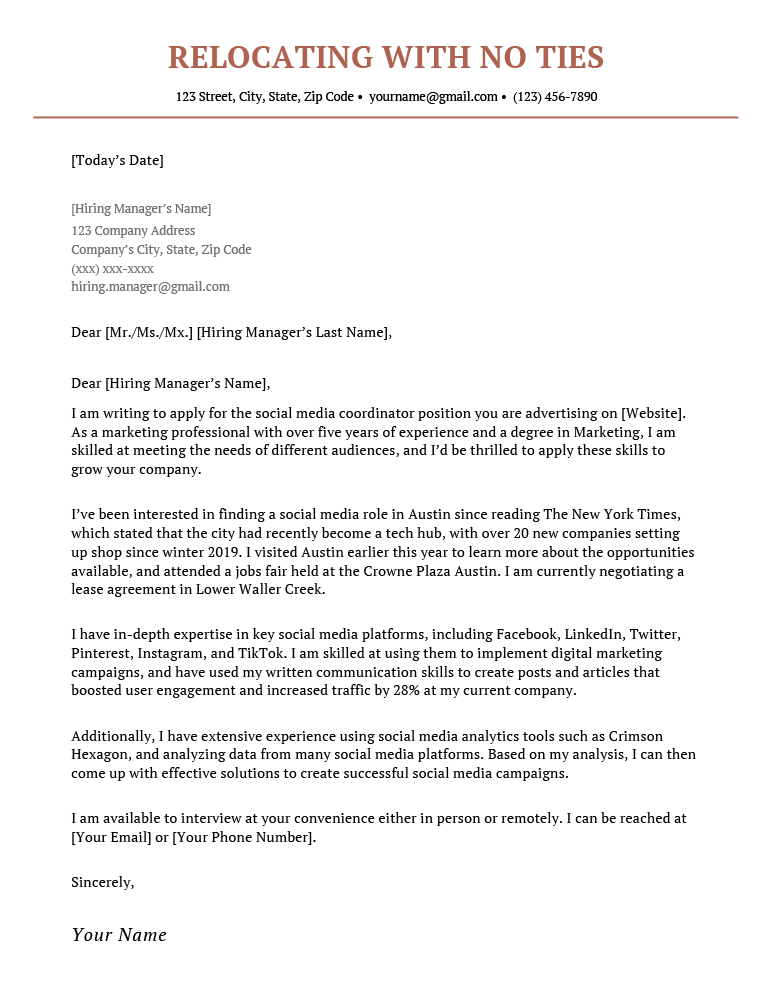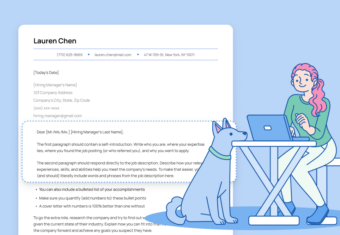Knowing how to write a cover letter highlighting your intention to relocate can be the difference between having a job secured when you arrive in a new city versus dipping into your savings for a few months until you’ve found one after moving.
To help you submit a relocation cover letter to your new boss that clearly explains your motives for moving, we’ve included three relocation cover letter examples, a template, and five writing tips.
Our free-to-use cover letter builder can make you a cover letter in as little as 5 minutes. Just pick the template you want, and our software will format everything for you.
Three relocation cover letter examples
First, here are three relocation cover letter examples covering three distinct different reasons for moving:
Relocation for a spouse
Here’s a cover letter example written by a candidate who’s making a permanent move by noting your partner has accepted a new job in the same city:
Relocation for an out-of-state job
Here’s how to show employers your willingness to relocate because of having family ties in the area:
Relocation with no ties
Don’t have a spouse that’s relocating or any family connections in the new area? You can still show hiring managers that you’re committed to your move and the new position.
If you secure a job offer in the city you want to move to but the compensation offered is on the low side, consider writing a counter offer letter and requesting a relocation allowance.
Here’s how to show employers your move is permanent by visiting the city in advance and negotiating a lease agreement:
Relocation cover letter template
Here’s a relocation cover letter template that you can easily copy and paste into Microsoft Word or Google Docs:
Date
Hiring Manager’s Name
Address
Telephone number
Dear [Mr., Ms., Mx. Hiring Manager’s Name]
Start your cover letter with an introduction about yourself. In this first paragraph, highlight your length of experience, the position you’re applying for, the company name, how you learned about the job opening, and why you’re interested.
In this next paragraph, give more details regarding your specific expertise and experience. Remember, try to match your experience with the job requirements posted online, and always incorporate numbers to give the hiring manager a clear idea of how you can add value to their team. Ideally, you’ll also want to add a career achievement to really pique the hiring manager’s interest.
Here, mention any additional job-relevant skills, experience, or credentials not included in the above paragraph.
Now is the time to let the hiring manager know that you’re relocating and why. Perhaps you have family in the area, or your spouse is being relocated to the city for a new position. Add any details here that reassure the employer that the move is permanent, or at least long-term.
In your conclusion paragraph, reaffirm your interest in the position, include your contact details (email and phone number), and state your availability for an interview. Be specific about your ability to conduct an in-person interview or remote if it’s your only option currently.
End your cover letter with an HR-approved sign-off, such as “sincerely.”
Put your name here
How to write a relocation cover letter
Hiring someone who isn’t currently living in the same city — or state — as the company is a risky choice for employers. An applicant might back out for many reasons before or after relocating.
To convince them you’re the best candidate, regardless of your current location, follow these five tips:
1. Explain why you’re relocating
Your relocation cover letter needs to highlight why you plan on moving. The more convincing your reasons are, the more persuasive your cover letter will be.
For example, moving close to elderly family members is a convincing reason, because you’ll want to take better care of them. Or, your partner might be being transferred to a new city by their company, and you need to find employment in the area.
In both cases, your relocation is justified based on your life situation. By contrast, wanting to move to Albuquerque because you thought it looked neat on Breaking Bad will not convince an employer you deserve an interview.
No hiring manager will risk interviewing you if they don’t believe there’s a genuine reason for your move. Show them you’ll stick around by emphasizing why you’re interested in relocating, like in these two examples:
I’m permanently relocating to Detroit to be closer to my mother and sister after the passing of my stepfather last year.
I will be permanently moving to San Francisco in March, where my entire immediate family all reside.
2. Prove you’ve done your research
If you’ve never visited the city where your target company is located, you at least need to show you’ve done some research about the place. This way, you’ll demonstrate your genuine commitment to the move, and you’ll show that this isn’t a decision you’ve made on a whim.
Here’s an example of how to show that you’ve done your research before moving:
I’ve wanted to find a biotech position in Boston after visiting last year, when I attended a job fair that hosted over 30 local medical companies. Since then, I’ve read many articles by the Atlantic, New York Times, and other publications regarding the growing biotech field in the city and am thrilled with the networking and career opportunities it presents. I am currently negotiating a lease in Cambridge and will be moving in January.
It’s clear that this job applicant has a good reason for wanting to move to Boston, and they’ve even started preparing for it by looking for accommodation.
I’ve wanted to find a biotech position in Boston after visiting last year, when I attended a job fair that hosted over 30 local medical companies. Since then, I’ve read many articles by the Atlantic, New York Times, and other publications regarding the growing biotech field in the city and am thrilled with the networking and career opportunities it presents. I am currently negotiating a lease in Cambridge and will be moving in January.
3. Give the company a timeframe and interview details
Most companies need a candidate in place as soon as possible, so you must inform them when you plan to start if selected for the position.
Be precise here. Name an exact date, or at least the month when you’ll be moving.
You also need to specify whether you can interview before your move date. If you can only interview remotely, make that clear. It might be the only option if you write a cover letter for an out-of-state job or are out of the country.
On the other hand, if your current location is close to where you’re relocating, think about attending a face-to-face interview before your move.
Here’s an example of how to give an employer a timeframe about your move and interview availability:
I will have permanently relocated to Austin by January 10, 2024 to be closer to my father and other immediate family after my mother’s passing last year. I am available for an in-person interview from December 16th onwards, or remotely immediately at your convenience. You can contact me at (512) 867-6523 or email@email.com to arrange a meeting.
4. State your ties and commitment to the new area
A big worry for potential employers is that you’ll only stay for a couple of months and leave town because you don’t like the city.
As a result, they’d have to re-open the position, costing them time and money.Your relocation cover letter needs to reassure employers that this won’t happen.
Did you grow up or have family in the city, or temporarily live there for an internship? If so, mention this in your letter.
Showing employers you have a legitimate tie to the city is a great way to convince them you’re interested in relocating for the long term.
Below is an example of how you can show you have commitments and ties in your new area:
I am permanently relocating to Seattle on December 15, 2023. My spouse has accepted a teaching position at the University of Washington and has immediate family in the area. I would be happy to attend an in-person interview from November 4 to November 10 when we’ll be in the area house hunting. I can be contacted at (206) 426-2876 or email@email.com.
5. Appropriately present your contact details
When writing your relocation cover letter, deciding which set of contact details to use is another dilemma.
Should you use your current address, risking rejection by a hiring manager who thinks you’re too far away? Should you omit your address and hope no one finds it suspicious? Or should you insert your planned location onto your cover letter?
If you’ve already signed a lease agreement or bought a house in the new area, use that address.
Otherwise, it’s best not to list any address. Instead, where you would write your address, list something descriptive such as “Relocating to Grand Rapids, Michigan on Nov. 25, 2023.”
Here’s an example of how to omit your address on your cover letter if you haven’t moved yet:

Click to rate this article
4.5 Average rating



